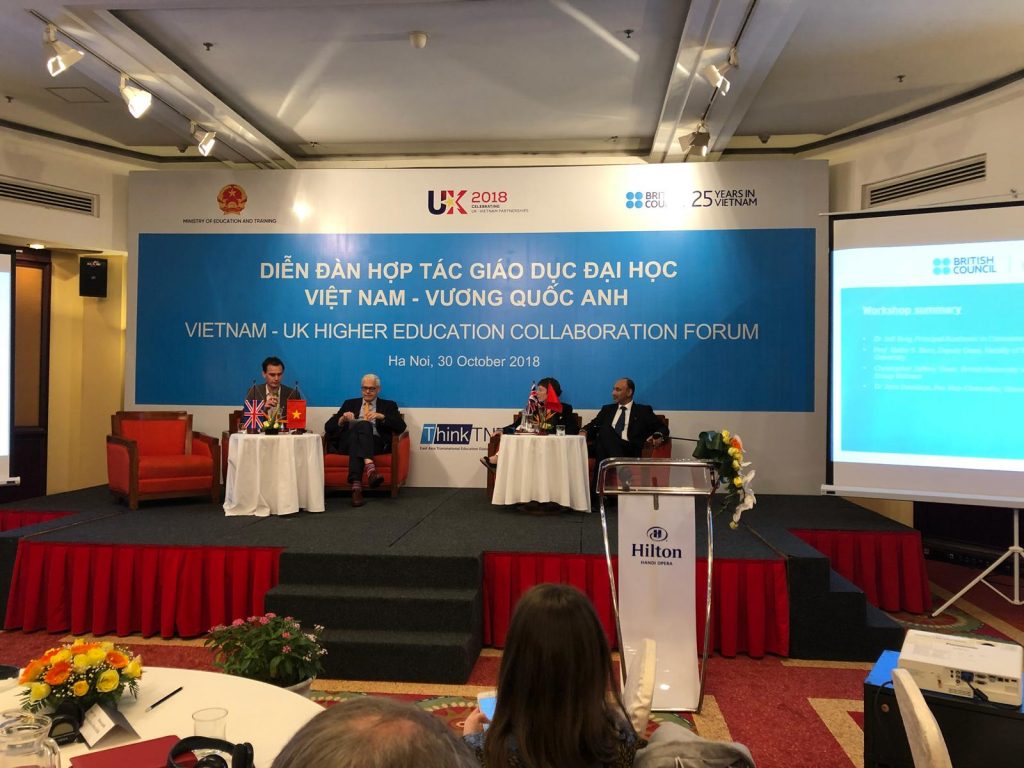The British Council has funded a number of projects aimed at developing research capacity in Vietnamese Universities. Middlesex University is working with several Universities from Vietnam as part of this set of projects. Our lead Vietnam partner is Van Lang University. The project is of course supported by the Faculty of Science and Technology at Middlesex University (@mdxsat).
Today, The British Council in Vietnam launched the projects with a conference exploring the challenges in building sustainable research led partnerships. The event was very well attended with over 120 delegates from almost 60 universities.
I led on a workshop exploring the challenges in how higher education can play a key role in implementing a national industrial strategy. Using the case study of the UK industrial strategy and exploring the actions underway in Vietnam, it is clear that the challenges are the same. I also took the opportunity to talk about Pepper our resident robot giving evidence at the House of Commons.
The pdf of the presentation is available here. Colleagues from Vietnam had not come across this news item so it was good to put the record straight.
Our workshop explored the role of higher education in human capital development for a country’s industrial strategy.
Support for forging long-term and collaborative relationships between industry and higher education is at different levels of maturity. The UK for example has specific funding approaches that encourage the development of industry and higher education such as Innovate UK. But then the impact of that investment needs to be measured. In Vietnam, partnerships very often develop at the institutional level. Panellist, Dr Anh from Hanoi Medical School gave an example in product usage and development in medical research.
We had some interesting discussion around challenges:
- A curriculum fit for purpose: One emerging theme from both the panel and the audience was how to make the curriculum fit for purpose. Issues around this centred around:
- How to retrain academic staff quickly to meet the needs of industrial skills shortages.
- How to have flexible curriculum that can be designed in a responsive mode with speed.
- Asymmetry between requirements of industry and student needs. The target audience is very different and has different behaviours – generation Y/Z for example does not want to be tied to one employer. (However, it is difficult to establish whether that is because of choice or the current environment)
- A second challenge was how to make interactions between HEIs and Industry sustainable for the long term. For example there will be many ways of funding but these are for short term 2-3 year projects. Plans for sustainability of relationships beyond the lifetime of projects are needed.
- There is a mismatch in the way universities work and the needs of industry. For example, HEIs are governed by a very well defined lifecycle. Industry often needs experts for short intensive time periods.
- However, increasingly, the value of an academic to industry is recognised in promotional schemes. So we can expect new ways of working as the idea of an Industry Fellow becomes embedded in higher education.
- We focused on the importance of Artificial Intelligence and machine learning in general. However, we need to think harder about the future of employment for future generations given the anticipated impact of robotics and AI in general.
- The issue of sustainability could possibly be attributed to the lack of a win-win cooperation between academia and industry. Each side wants to maximise their benefit on the basis of imperfect competition.
The summary was presented at the end of the conference.
